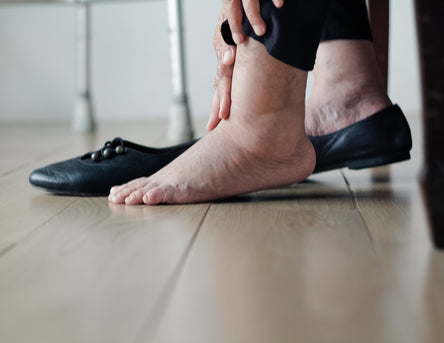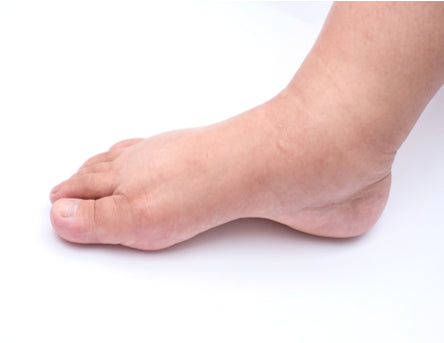Edema or Swelling of the Foot
Why Your Feet/Ankles Might Be Swollen
Swollen ankles and feet are quite common and not usually a cause for concern, especially if you spend a lot of time on your feet each day. If your feet and ankles remain swollen though, even after prolonged time off your feet, then you might have Edema.
Swelling of the feet, also known as peripheral edema, is caused by an accumulation of fluid in the feet. Occasional swelling is not usually very painful or serious, but if it is persistent it could signal a more serious health problem and the need to see a doctor.

Edema can be uncomfortable and home remedies are often effective in lessening the swelling.
What Is Edema/Swelling?
Edema can commonly be called "swelling" as well. Edema in the feet is accumulation of body fluid in the feet and ankles. Our bodies are mainly made up of water, but sometimes they retain too much. Typically when you are on your feet for a prolonged period of time, or on a long airplane flight, your body will retain more water, however this goes away on its own. Edema is a condition where this fluid is trapped and the swelling does not go away on its own.
What Are the Symptoms of Edema/Swelling?
You may not notice the typical swelling that occurs in your feet, but with prolonged swelling the signs are much more noticeable.
Symptoms of edema include:
- You are running a fever
- You are pregnant and experience sudden or severe swelling
- Home remedies prove unsuccessful
- Your swelling has gotten worse
- You have a history of heart, kidney, or liver disease
What Causes Edema/Swelling?
There are multiple causes for Edema, some are serious and others are not.
Standing or sitting for long periods, being overweight, an airplane ride, pregnancy, and an injury such as a sprained ankle are all possible causes for swelling in the feet.
There are also certain medications which reduce blood circulation and increase the thickness of the blood. This can cause edema in the feet and other areas of the body. Review the side effects of your medications to see if they can cause edema.
Edema is also associated with many medical conditions. Because of this, it is a good idea to talk to your doctor if you are experiencing persistent or painful swelling, especially if it is accompanied by other symptoms.

If your swelling is persistent or painful, consult a doctor about treatment.
How Can I Treat Edema in My Feet/Ankles?
Elevate The Affected Area
Whenever you are relaxing or lying down, be sure to elevate the affected leg. It’s a good practice anyway if you’ve been on your feet for awhile. Make sure your legs are raised above your heart to help reduce the symptoms of swelling.
Stay Active
Simple things such as daily activities which include stretching and moving the legs can help to reduce edema. Try adding a daily walk to your routine, or a midday stretch to keep your blood moving and your legs and feet healthy.
Wear Supportive Clothing
The clothing you wear matters and can help improve, or even hurt, your recovery. Avoid clothing that is too tight or restrictive as this can make your symptoms worse. Instead, wear clothing that is not restrictive and supports blood flow.
Additionally, you can wear a graduated compression sock around your foot/ankle and calf to support your leg, help with circulation and minimize swelling. Compression stockings have been medically proven to be beneficial for swelling relating to certain medical condtions. Check with your doctor to see if they are a good option in your case.
Other Solutions
If the swelling is due to an injury, avoid walking on the foot. Using ice packs and compression bandages can also help, as can elevating the foot above the heart. Home remedies can be effective, but if the symptoms persist you should see a doctor to determine the cause of the swelling and if medical treatment is needed. It is normal to experience edema during pregnancy but contact your doctor if the swelling you experience is sudden or excessive.
When to See a Doctor About Foot/Ankle Swelling
While edema is not always a cause for concern, prolonged swelling can be a sign of something more serious.
You should reach out to your doctor if you experience any of the following:
How To Prevent Edema/Swelling In Your Feet
You can’t guarantee you’ll never experience swelling in your feet; however, you can maintain good habits to keep your body healthy and try to avoid it.
Some of the best things you can do are:
- Exercise regularly and maintain good circulation. The CDC lists a breakdown of recommended exercise duration for different age groups.
- Avoid prolonged periods of sitting/standing. Make sure to get up and move periodically - if you are on a long flight take a walk down the aisle or if you are on a long car ride try to pull over every few hours to stretch your legs. When working, make sure to take frequent breaks as well!
- Monitor your salt intake. Watch out for hidden salt in food, snacks, or drinks which can increase water retention and swelling.

With good habits and exercise you can minimize your risk of swelling in your feet.
